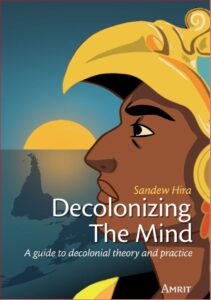 For twelve years Sandew Hira has been working on a book titled Decolonizing The Mind – a guide to decolonial theory and practice.
For twelve years Sandew Hira has been working on a book titled Decolonizing The Mind – a guide to decolonial theory and practice.
You can download the table of content of the book here and the Introductory chapter here.
You can order the book here.
There are five things that makes this book special.
First, across the globe there is a rise of a movement inside and outside the academia that labels their narrative as “decolonial”. Academics and activists have made great contribution to decolonial theory and practice.
Hira’s book is an attempt to bring these contributions together in a comprehensive, coherent and integral theoretical framework. Western Enlightenment has produced two such frameworks: Liberalism and Marxism.
A comprehensive, coherent and integral theoretical framework has the following characteristics:
- It is comprehensive because it has produced concepts of how to look at the most important dimensions of a society: a world view, economics, social relations including relations with nature, politics and culture. There are other important aspects of a society, but these dimensions are essential to make a framework comprehensive.
- It is coherent because its concepts don’t contradict each other. They are consistent and logical.
- It is integral because the concepts of the different dimensions are not just lumped together but are related to each other from a basic concept. In Liberalism it is “individual freedom” and in Marxism “class struggle”. In decolonial theory it is mental slavery and decolonizing the mind.
Second, the book is a systematic guide to decolonize the mind. Decolonizing the mind consists of three dimensions:
- The critique of the Western colonization of the mind and thus Eurocentric knowledge production.
- The development of an alternative comprehensive, coherent and integral knowledge production.
- The translation of this new knowledge in viable policies to built a new pluriversal world civilization.
Third, the book appeals both to academics who can use the book as teaching material, but also to activists who are figuring out to build social movements that go beyond the dichotomy of Liberalism and Marxism.
Fourth, the book is part of a greater vision on how to produce and disseminate decolonial knowledge. It is not only about producing and distributing a book. It is also about linking theoretical concepts with art. An example is the musical documentary produced by artist Pravini: The Uprising.
And most importantly, the book is a basis discussing decolonial knowledge in summer school, lectures, courses, workshops etc.
